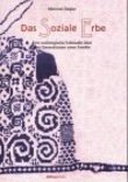Explore

Die Studie untersucht am exemplarischen Fall einer Familie- wie kulturelle Wertvorstellungen und Lebensorientierungen von Generation zu Generation tradiert werden. Damit wird das Phänomen des sozialen Erbces zum zentralen Gegenstand der Arbeit: Soziale Erbschaften implizieren die Übertragung, die Übernahme und die Transformation von immateriellen, kultulellen Gütern im familiären Prozeß. In welcher Weise werden Frauen und Männer bei der Entfaltung ihrer individuellen Lebensverläufe durch in der Familie tradierte Sinnorientierungen und kulturelle Werte beeinflußt?Die familiären Tradierungsprozosse werden im historischen und gesellschaftlichen Kontext des sozialen Wandels in diesem Jahrhundert dargestellt und untersucht. Es sind gerade diese Rahmenbedingungen, die soziale Erbschaften in ein komplexes Phänomen mit ambivalenten und widersprüchlichen Charakter verwandeln. Mit der Einbettung in diesen soziologischen Zusammenhang berührt die Arbeit ein zentrales Thema der aktuellen sozialwissenschaftlichen Diskussion über den Prozeß der gesellschaftlichen Modernisierung. In dieser Diskussion wird vielfach, etwa im Rahmen der dominierenden Konzepte der "Individualisierung" (U. Beck) und "Enttraditionalisierung" (A. Giddens), von einem Bedeutungsverlust des Herkunftsmilieus und einer Erosion von Traditionen ausgegangen, Die vorliegende detaillierten empirischen Untersuchung eines exemplarischen Falles zielt nicht zuletzt auch darauf, die Innenseite dieser makrosoziologischen Konzepte zu erfassen und sie aus dieser Perspektive einer kritischen Prüfung zu unterziehen.Ziwei zentrale Ergebnisse der Fallstudie können hervorgehoben werden:Erstens: Soziale Bewegungen fördern einen transformativen Prozeß, mit dem eine junge Generation von den Eltern ererbte Traditionen entsprechend der eigenen Lebensbedingungen und lebensgeschichtlichen Ansprüche umschreibt. Am Beispiel der mittleren Generation der Fall-Familie, geboren um 1948 und im Kontext der sozialen Bewegungen von 1968 engagiert, läßt sich zeigen, das diese Form eines aktiven Erbens trotz der kritischen Reinterpretation von familiären Traditionen mit einem spezifischen Sinn von Geschichtlichkeit verbunden ist. Diese mittlere Generation erlebt sich nicht als Opfer, sondern als Akteur des sozialen Wandels.Zweitens: Die Bedeutung von familiären Tradierungen wird umso größer, je mehr sich die kulturellen Sinnsysteme pluralisieren. Mit dieser These kann der Typus des sozialen Erbens zusammengefaßt werden, der sich bei der jungen Gerneration der Fall-Familie zeigt, die um 1972 geboren ist. Für diese Generation gewinnen die konkreten Lebensmodelle der EItern einen besonderen biographischen Stellenwert, weil sie als Moment der Vermittlung gegenüber reflexiv und unübersichtlich gewordenen kulturellen Sinnwelten fungieren. Bei den Versuchen, das soziale Erbe zu transformierem, ist diese Generation auf stch selbst zurückgeworfen und erlebt das Gefühl der Getriebenheit durch den sozialen Wandel.Die Arbelt ist auch mit einem methodologischen Anliegen verbunden. Sie soll dem Design der soziologischen Einzelfallstudie im Rahmen des interpretativeen Pradigmas neue Impulse geben. Insbesondere wird versucht, zwei anerkannte und bewährte sozialwissenschaftlichen Konzepte in die soziologische Empirie zu integrieren: das kulturantbropologische Konzept der "dichten Beschreibung" und das psychoanalytische Konzept des "szenischen Verstehens". Aus diesem Grund ist der Darstellung und Analyse des Phänomens des sozialen Erbes ein ausführlicher methodologischer Abschnitt vorangestellt.
This book is included in DOAB.
Why read this book? Have your say.
You must be logged in to comment.
Rights Information
Are you the author or publisher of this work? If so, you can claim it as yours by registering as an Unglue.it rights holder.Downloads
- 115 - pdf (CC BY-NC-ND) at OAPEN Library.
- 192 - pdf (CC BY-NC-ND) at OAPEN Library.
Keywords
- Case studies
- Erzählung
- Family
- generations
- Interpretative Sozialforschung
- Realität
- Social conditions
- Social heritage
- social heritage, social inheritanc
- social inheritanc
- Society & Social Sciences
- Sozialer Wandel
- Soziales Erbe
- Soziales Erbe, Sozialer Wandel, Interpretative Sozialforschung
- thema EDItEUR::J Society and Social Sciences
Links
DOI: 10.26530/oapen_574827Editions

